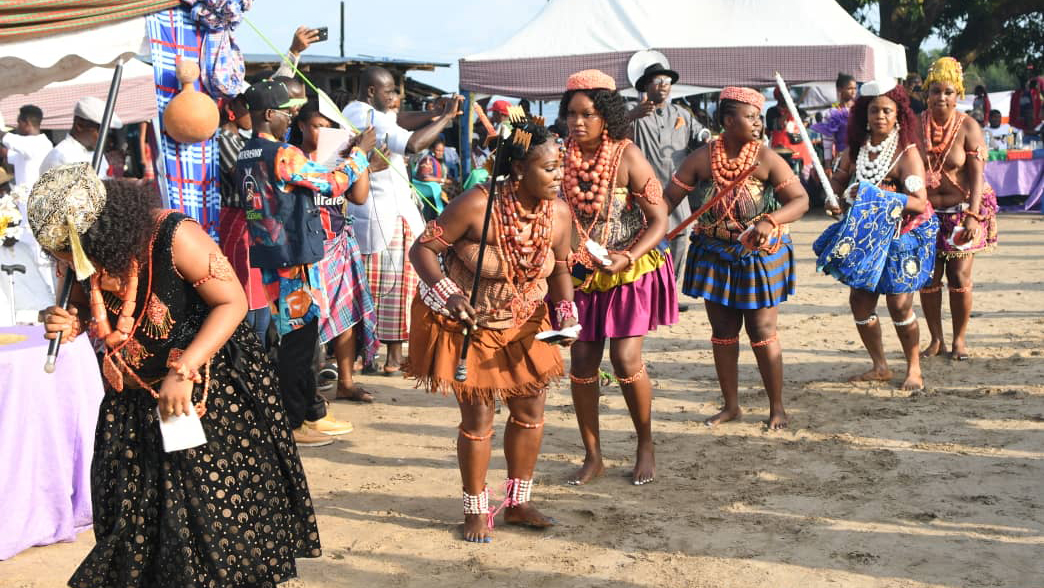In an increasingly globalised world, where cultures and traditions are at risk of becoming homogenised, celebrating and safeguarding living heritage has become essential, as it reminds humanity of the beauty in their differences and the strength in their shared humanity.
For the United Nations Educational and Scientific Cultural Organisation (UNESCO), October 17 is very significant as the day marks intangible cultural heritage, also called living heritage.
However, October 17 and 18, 2025, hold very significant place in Onitsha, as it marks the yearly Ofala Festival, a cultural event that has redrawn the landscape of this town noted for commerce.
Overall, the festival is a vibrant celebration of Onitsha’s cultural heritage, attracting national and international attention while promoting unity and cultural preservation.
Ofala Festival goes back to the founding of the town in the 16th century and is the highpoint of the Onitsha ceremonial cycle. Rooted in deep spirituality, it usually falls due early to mid-October and is an occasion for the monarch to fulfill certain obligations.
These past six years, the festival has grown in scope and recognition, incorporating international art exhibitions, lecture series, and the youth carnival.
Within same period, the Ofala Festival has received endorsements from the Nigerian Tourism Development Corporation and a Certificate of Recognition for Excellence in Culture from the United Nations World Tourism Organisation.
The theme for the 2025 festival, Njiko na Ntachi, serves as a reminder of the importance of community and resilience. By embracing this theme, the festival aims to: “Foster Unity: Encourage individuals to come together, promoting a sense of belonging and purpose; Promote Resilience: Inspire individuals to draw strength from their cultural heritage and community, persevering through challenges as well as upholding Enduring Communal Values: Strengthen and preserve the timeless values that define the community,” said Nn’emeka Maduegbuna, a member of the 2025 steering committee.
Featuring a blend of traditional and modern activities, the festival marks the Obi’s successful negotiation of the kingdom’s fortunes during seclusion and commemorates the discovery of yams as a food source.
The festival reflects the richness of Onitsha cultures and the deep connection they share with their ancestors, while also serving as a driving force for the future.
The two days take multiple forms in everyday life: dances, stories, interactions with the universe, craftsmanship, arts, traditions, and festivities… These are all reflections of the generations that came before, and the essence of today’s humans.
The first day of the festival, known as Iru Ofala, focuses on the monarch’s parade and dance, while the second day, Azu Ofala, features elaborate displays by age-grade societies in colourful uniforms.
The entire community cutting across positions, age and gender is involved in the festival and has roles to play. This is also evident in the ceremonies preceding the Ofala.
The Owuwaji (eating of new yam) is celebrated by all sections of the community. The monarch’s diviners prepare him for inye ukwu na nlo (annual spiritual seclusion). Whilst he is secluded, Ogbalido (feast of atonement) by brave men including ndichie takes place during which these warlords rejuvenate themselves.
According to Maduegbuna, “it is also an opportunity for the three senior ndichie to review the chiefs under their command. The women are quite active in the Ofala, their culinary activities, the display by the elite Otu Odu titled women, and their very visible role within the age grade societies that are a prominent feature of Azu Ofala, which is the second day.”
Ofala Youth carnival, which has evolved from the traditional early morning igba ilo Ofala, youth procession around the town, is designed to create awareness for the festival. This has become a major component of the yearly feast.
Some of the activities lined-up for this year’s feast include, Ofala Lecture Series: A yearly lecture series named after Obi Nnaemeka Achebe, recognising his contributions to public relations.
There is also Oreze Art Exhibition: A showcase of paintings, sculptures, and ceramics featuring works by Nigerian and African artists. The Ofala Youth Carnival: A colourful street funfair showcasing Onitsha’s cultural heritage and Ofala Thanksgiving Service: A thanksgiving service held to give thanks for the success of the festival and the monarch’s reign, usually held at a local church. Events of this year’s festival start Wednesday, October 8, 2025 at 6:00pm with Inye Ukwu Na Nlo Eze Onicha.
Over the years, the festival has become the catalyst for socio-economic growth of Onitsha. The growing popularity of Ofala Onicha also brings tangible social and economic benefits.
Increased attendance translates into boosted local commerce, with nearly ₦1 billion circulating through festival-related activities. This direct investment benefits local traders, caterers, fashion designers, hoteliers, transporters, and other small businesses that support various festival stages.
Participants and groups typically don elaborate and beautifully crafted attires. Age grades and dance troupes wear coordinated outfits, often commissioning new designs for the occasion.
The Ndichie, Agbalanze and Otu Odu also invest in traditional regalias, creating substantial business opportunities for local tailors and designers.
Food and drink expenditures for guests and performers provide additional income for local service providers. While these economic benefits may be subtle to the casual observer, they represent a vital revenue stream for the community.
“The rise in business also drives employment, leading to broader social improvements such as reduced crime rates and enhanced quality of life. Beyond direct festival spending, there is also a sustained effort to develop and support young entrepreneurs and micro-businesses in the community through training and financing.
Throughout the year, programmes supporting youth, women, and entrepreneurs including training, financing, and cultural events like the Golibe Festival are facilitated by the Onitsha Development Fund and other stakeholders, sustaining the festival’s socio-economic momentum,” said Maduegbuna.






